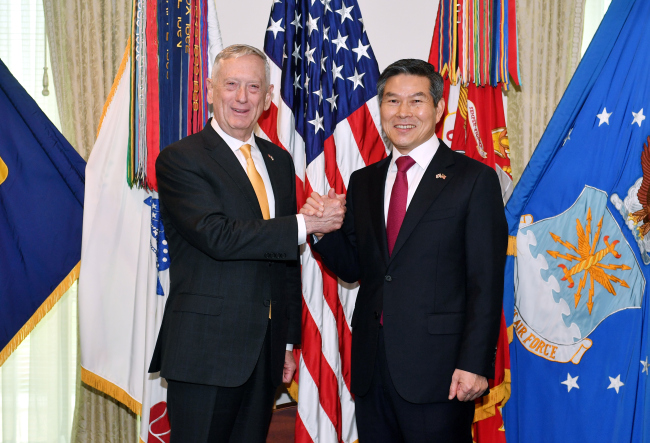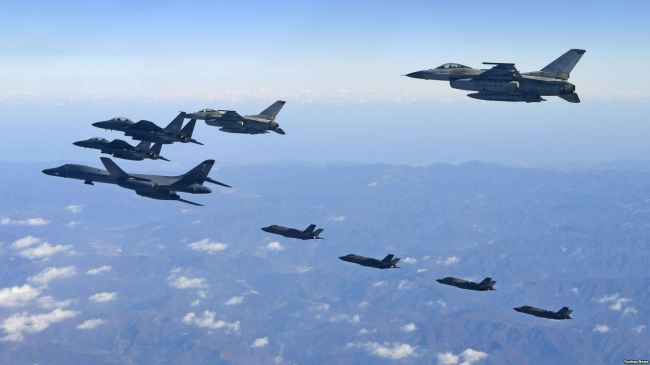WASHINGTON -- The latest decision by South Korea and the United States to suspend another combined exercise drew mixed reactions Wednesday, with supporters hailing it as a way to build trust with North Korea and critics highlighting its negative impact.
During the 50th Security Consultative Meeting in Washington, Defense Minister Jeong Kyeong-doo and his US counterpart, James Mattis, finalized their decision to halt the Vigilant Ace air exercise to back ongoing diplomacy to induce Pyongyang's denuclearization.
With the suspension, the US will not deploy its augmentation forces to the peninsula for the December exercise. But South Korea's air force will still conduct its own drills, a Seoul official said.
 |
Defense Minister Jeong Kyeong-doo (right) and US Secretary of Defense James Mattis, October 31, 2018 (Yonhap) |
The suspension is the latest in a series of decisions by the allies this year to cancel annual exercises, such as the summertime Ulchi Freedom Guardian, to avoid provoking the communist regime with maneuvers it blasts as a "rehearsal for a war of invasion."
Supporters of the decision said that the suspension will strengthen the momentum for dialogue with Pyongyang aimed at denuclearizing the country and establishing a lasting peace regime on the peninsula.
They argue that the suspension may not affect the allies' overall combat readiness and that they can continue to sharpen their military skills through less threatening methods, such as using high-tech communication tools and computer simulations rather than bringing together their materiel for physical exercises.
However, naysayers argue that another halting of the combined drills would chip away at the allies' combined defense capabilities.
"The air forces' combined exercise is very important in terms of getting familiarized with the terrain features and raising fighter pilots and practicing implementing delicate missions," said Park Won-gon, a security expert at Handong Global University.
"If the exercise were scaled back or the forces from the mainland US could not join the exercise, this would lead to a weakening of their combat proficiency and could negatively affect the military readiness posture," he added.
During last year's Vigilant Ace, the allies mobilized 270 aircraft, including radar-evading fighter jets such as F-22s, F-35As and F-35Bs in a show of force against North Korea, which had launched a series of nuclear and missile provocations.
This year's decision to suspend the drills reflects the growing peace mood that has been forged by diplomatic efforts to engage Pyongyang in return for its strategic shift towards economic development and commitment to "complete denuclearization."
The US first proposed the suspension.
During a meeting with Jeong on the sidelines of the ASEAN Defense Ministers' Meeting Plus in Singapore earlier this month, Mattis made the proposal to buttress diplomacy for the denuclearization of the peninsula.
However, Jeong floated the idea of readjusting the air exercise or conducting it in a different way to maintain the combined defense posture, postponing an official announcement of the move until the SCM.
Vigilant Ace first began under the name of "Pen-ORE" (Peninsula Operational Readiness Exercise) in 2015. Since then, it has been held annually with the mobilization of a large fleet of aircraft from the allies.
 |
Fighter jets flying during US-South Korea joint air drill (Yonhap) |
Some observers say that the suspension of the exercise is in line with US President Donald Trump's earlier decision to stop what he called "provocative, expensive war games."
In tune with the decision, the allies called off the Korea Marine Exercise Program and UFG. The move triggered speculation that Seoul and Washington could halt all other drills together in a way that would undermine the decadeslong security alliance and damage their military preparedness.
Outgoing US Forces Korea Commander Gen. Vincent Brooks, however, has stressed the allies' ongoing efforts to "creatively and innovatively create readiness in our force and preserve it once we have created it."
"The exercises are flexible. That is (what South Korean) President Moon has spoken about. Those four levers are where the flexibility comes from -- timing, scope, scale and communication volume. That is the way we are approaching and will approach (the matter)," he said during a Seoul forum in June.
The allies have not made any decision over whether to hold next year's annual exercises. (Yonhap)






![[Herald Interview] 'Trump will use tariffs as first line of defense for American manufacturing'](http://res.heraldm.com/phpwas/restmb_idxmake.php?idx=644&simg=/content/image/2024/11/26/20241126050017_0.jpg)

![[Health and care] Getting cancer young: Why cancer isn’t just an older person’s battle](http://res.heraldm.com/phpwas/restmb_idxmake.php?idx=644&simg=/content/image/2024/11/26/20241126050043_0.jpg)
